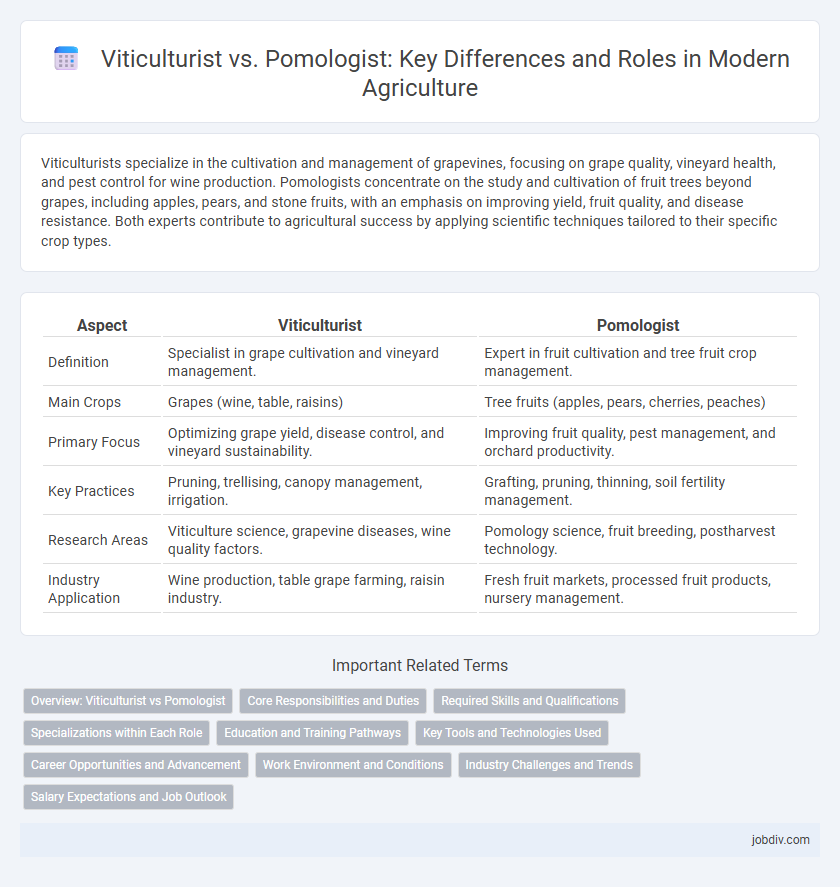Viticulturists specialize in the cultivation and management of grapevines, focusing on grape quality, vineyard health, and pest control for wine production. Pomologists concentrate on the study and cultivation of fruit trees beyond grapes, including apples, pears, and stone fruits, with an emphasis on improving yield, fruit quality, and disease resistance. Both experts contribute to agricultural success by applying scientific techniques tailored to their specific crop types.
Table of Comparison
| Aspect | Viticulturist | Pomologist |
|---|---|---|
| Definition | Specialist in grape cultivation and vineyard management. | Expert in fruit cultivation and tree fruit crop management. |
| Main Crops | Grapes (wine, table, raisins) | Tree fruits (apples, pears, cherries, peaches) |
| Primary Focus | Optimizing grape yield, disease control, and vineyard sustainability. | Improving fruit quality, pest management, and orchard productivity. |
| Key Practices | Pruning, trellising, canopy management, irrigation. | Grafting, pruning, thinning, soil fertility management. |
| Research Areas | Viticulture science, grapevine diseases, wine quality factors. | Pomology science, fruit breeding, postharvest technology. |
| Industry Application | Wine production, table grape farming, raisin industry. | Fresh fruit markets, processed fruit products, nursery management. |
Overview: Viticulturist vs Pomologist
Viticulturists specialize in the cultivation and management of grapevines, focusing on optimizing vineyard conditions to produce high-quality grapes for wine, table fruit, or raisins. Pomologists study the biology, cultivation, and harvesting of fruit trees, working to improve fruit quality, yield, and disease resistance across a wide range of species such as apples, pears, and peaches. Both disciplines contribute to sustainable agricultural practices but differ primarily in their crop specialization and applied techniques.
Core Responsibilities and Duties
Viticulturists specialize in the cultivation and harvesting of grapevines, focusing on soil preparation, vine training, pest management, and optimizing grape quality for wine production. Pomologists concentrate on the study and cultivation of fruit trees such as apples, pears, and cherries, emphasizing breeding, disease control, and improving fruit yield and quality. Both experts apply horticultural science but differ in crop type and specific agricultural practices tailored to vine management or tree fruit production.
Required Skills and Qualifications
Viticulturists and pomologists both require strong knowledge of plant biology, soil science, and pest management, but viticulturists specialize in grapevine cultivation and winemaking processes while pomologists focus on fruit tree production such as apples and pears. Viticulturists often hold degrees in viticulture, enology, or horticulture and need skills in vineyard management, irrigation techniques, and grapevine disease identification. Pomologists typically have education in pomology, horticulture, or agricultural science with expertise in orchard management, pruning methods, and fruit crop improvement strategies.
Specializations within Each Role
Viticulturists specialize in the cultivation and management of grapevines, focusing on optimizing vine health, pest control, and grape quality for wine production. Pomologists concentrate on the study and cultivation of fruit trees such as apples, cherries, and pears, emphasizing fruit development, harvesting techniques, and disease management. Both roles require expertise in plant physiology and soil science but differ in crop type and specific horticultural practices.
Education and Training Pathways
Viticulturists typically pursue degrees in viticulture, plant science, or horticulture, emphasizing grapevine biology, vineyard management, and wine production techniques. Pomologists often study pomology, horticulture, or agricultural science, focusing on fruit tree physiology, breeding, and orchard management. Both careers require hands-on experience through internships or apprenticeships in vineyards or orchards to develop practical skills essential for successful crop production.
Key Tools and Technologies Used
Viticulturists primarily utilize advanced soil moisture sensors, canopy management software, and precision irrigation systems to optimize grapevine growth and fruit quality. Pomologists rely heavily on plant breeding tools, fruit maturity analyzers, and post-harvest technology such as controlled atmosphere storage and automated sorting equipment to enhance fruit production and maintain quality. Both specialists incorporate GPS mapping and drone technology for monitoring crop health and improving yield efficiency in their respective fields.
Career Opportunities and Advancement
Viticulturists specialize in grape cultivation, offering career opportunities in vineyard management, wine production, and research focused on improving grape yield and quality. Pomologists focus on the science and cultivation of fruit trees, providing advancement in orchard management, breeding programs, and fruit quality enhancement. Both career paths require expertise in plant biology and offer roles in academia, industry, and agricultural consultancy with potential for progression into senior specialist or managerial positions.
Work Environment and Conditions
Viticulturists primarily work in vineyards, often exposed to outdoor conditions such as varying weather, soil types, and seasonal changes to manage grape cultivation for wine production. Pomologists typically operate in orchards or research labs, focusing on fruit tree growth and breeding, encountering a mix of fieldwork and controlled environments. Both professions require physical stamina and adaptability to fluctuating climate conditions but differ in crop specialization and habitat settings.
Industry Challenges and Trends
Viticulturists face challenges such as climate change impacting grape yield and disease management, requiring innovative irrigation and pest control techniques. Pomologists contend with fruit tree diseases and adapting cultivars to shifting climatic zones, emphasizing genetic research for resilience. Both industries trend towards sustainable practices, precision agriculture, and technological integration to boost productivity and quality.
Salary Expectations and Job Outlook
Viticulturists focused on grape cultivation typically earn between $50,000 and $80,000 annually, driven by demand in wine regions with steady job growth projected at 5% over the next decade. Pomologists, specializing in fruit crop production such as apples and cherries, have salary expectations ranging from $45,000 to $75,000, with job opportunities expanding due to rising consumer interest in specialty fruits. Both careers benefit from increasing sustainable agriculture practices, but viticulturists may experience higher earning potential in premium wine markets.
Viticulturist vs Pomologist Infographic

 jobdiv.com
jobdiv.com